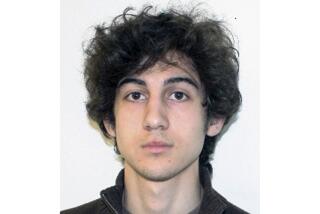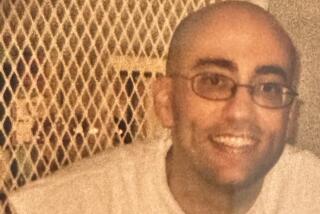Judge Rejects McVeigh’s Bid to Delay Death
- Share via
DENVER — U.S. District Judge Richard P. Matsch refused Wednesday to further postpone the execution of Timothy J. McVeigh, saying he found no proof in newly discovered FBI files that anyone other than McVeigh “was the instrument of death and destruction” in the Oklahoma City bombing.
Though clearly disturbed by the FBI’s handling of the case, Matsch said there appeared to be nothing in documents turned over by the agency to indicate that McVeigh was innocent.
Barring any last-minute successful appeals here or in Washington, McVeigh is just four days from execution, at 7 a.m. Monday at the federal government’s new death row chamber in Terre Haute, Ind. He would become the first federal prisoner executed in 40 years.
His lawyers, visibly disappointed that Matsch ruled against them, immediately announced that they will appeal to the U.S. 10th Circuit Court of Appeals here today and that, if they lose, will turn to the U.S. Supreme Court.
“It’s hard to say what will happen now,” said Richard Burr, one of McVeigh’s lead attorneys and an expert on death row appeals. “But our work will definitely go into the weekend.”
In January, McVeigh had dropped all legal appeals and convinced Matsch that he wanted to die. At that time, the federal Bureau of Prisons set his execution for May 16.
But just six days before McVeigh was scheduled to die, FBI officials revealed that they had found agency files that had not been disclosed to the defense, prompting Atty. Gen. John Ashcroft to postpone the execution until Monday. Ultimately, more than 4,000 pages of files were found.
“Whatever may in time be disclosed about possible involvement of others in this bombing, it will not change the fact that Timothy McVeigh was the instrument of death and destruction,” the judge said. “For that, he was sentenced to death by lethal injection.”
And Matsch, as if for emphasis, repeated that, “whatever role others may have played, it’s clear that Timothy McVeigh committed murder and mayhem as charged.”
The judge also said that, while it was not within his purview to criticize the FBI, he hoped the agency would be forced to answer for its eleventh-hour blunder.
“It is the function of others to hold the FBI accountable for its conduct here, as elsewhere,” he said. “And I would expect that there would be consequences upon finding . . . an undisciplined organization or organization that is not adequately controlled, or that can’t keep track of its information.”
McVeigh’s defense attorneys had sought a stay of execution on several fronts.
They claimed that the discovery last month of new FBI files was a “fraud upon the court” because the government and the defense had agreed before McVeigh’s trial that all of the material in the massive investigation would be turned over.
Furthermore, they strongly suggested that the FBI only admitted the recent discoveries for fear of being caught. They said they believe the FBI still has information that others helped McVeigh but has refused to disclose it because McVeigh is about to die.
They have even suggested that some government authorities might have known about the bombing plot in advance.
But assistant prosecutor Sean Connelly said there is no new material helpful to McVeigh.
He said that when he learned of the FBI blunder he immediately had the first batch of newly discovered files flown on an FBI plane to his office in Denver and then distributed copies to the McVeigh team and the lawyers for his convicted collaborator, Terry L. Nichols, who was sentenced to life in prison.
Connelly did concede, however, that new documents continued to show up even after high-ranking FBI officials had sent out 16 separate directives for agents to collect any new material.
“I’m willing to accept that the system broke down,” Connelly said. “The system didn’t work as we thought it was working.”
Matsch, who on occasion has displayed a short, fiery temper in the courtroom, described his emotions upon reading about the discovery of the new FBI files while he was working in his court chambers and not on the bench.
“It’s a good thing I was in quiet chambers and not in court because my judicial temperament escaped me when I read it,” he said. “It was shocking.”
But Matsch said that even if there were others involved beyond McVeigh and Nichols, McVeigh was convicted on other counts in the indictment against him that went beyond his role in the conspiracy.
Matsch noted that McVeigh also was found guilty of using a “weapon of mass destruction,” of destroying the Alfred P. Murrah Federal Building and of first-degree murder in the deaths of the eight federal law enforcement officials killed that day.
He said the new material falls far short of the legal requirements to cast doubt on McVeigh’s guilt.
The law, the judge said, stipulates that any new evidence be “favorable” to McVeigh, that “the evidence must have been suppressed by the prosecution either willfully or inadvertently” and that “there is a reasonable probability that the suppressed evidence would have produced a different verdict.”
In Washington, Ashcroft called it “a ruling for justice.”
He commended the FBI for coming forward when it discovered the missing documents, saying that it “allowed me to do the right thing” in postponing the execution until Monday.
Ashcroft did not explain, however, why the FBI waited until less than a week before the May 16 execution to announce the discovery of the new files, although some of that new material was found as far back as December.
Among the victims, Peggy Broxterman, a retired schoolteacher whose son, Paul, was killed in the blast, plans to fly from her Las Vegas home to Terre Haute to watch McVeigh die. Her son was one of the eight federal law enforcement officials killed, and she said she was not surprised by the judge’s ruling.
“The federal government ought to go along with the execution--it was their federal officers that were dying,” said Broxterman, 70. “It was their building that got blown up.”
When the original execution date was pushed back, “it was quite crushing to me,” Broxterman said. “He is so guilty, you understand? There’s no doubt in anybody’s mind.”
Kathy Wilburn, whose two grandsons died in the explosion, was more skeptical. Like many victims and relatives of those who died, she believes there are others beyond McVeigh and Nichols who should be brought to justice.
She plans to watch the execution on closed-circuit television in Oklahoma City. Still, she fears that silencing McVeigh forever is a mistake.
“Dead men don’t talk,” she said.
And in Pendleton, N.Y., McVeigh’s father, Bill McVeigh, said he was disappointed by the ruling.
“I think the longer he lives the better. It’s easiest on me,” he said. “But . . . it’s going to happen eventually.”
Only one victim, Paul Heath, came to Matsch’s courtroom to hear the ruling. When it was announced, he began crying.
“They can appeal it further all they want, but nothing is going to happen,” said Heath, a Veterans Administration employee who was inside the building but came away unharmed by the bomb blast. “There’s no evidence to suggest that anyone else was involved. Absolutely not. Nobody else was there.”
Asked about persistent conspiracy theories and whether a “John Doe No. 2” ever existed and helped McVeigh rent the Ryder truck that carried the bomb, Heath waved his hand dismissively.
“That’s a horse that’s been ridden to death,” he said.
Heath was brought to tears by the judge’s powerful words at the end of his ruling--Matsch’s first opportunity to sum up his feelings about McVeigh since the 33-year-old former Army sergeant was convicted in his courtroom in 1997.
The judge said:
“For anyone who heard and saw the evidence presented at the trial of Timothy McVeigh, there can be no doubt that on April 19, 1995, around 9 in the morning, Timothy McVeigh parked a Ryder truck in front of the Alfred P. Murrah Building in Oklahoma City; that the truck was packed with explosives; that Timothy McVeigh ignited fuses attached to those explosives and walked away.
“That at 9:02 that morning, those explosives were detonated, killing 168 men, women and children; maiming, disfiguring and seriously injuring many more people; the destruction of the building; and the destruction of government services.
“The evidence suggests that the motivation for this attack was anger at the conduct of the government, law enforcement agencies, in the tragic occurrences at Waco, Texas, and Ruby Ridge, Idaho, and that Timothy McVeigh was retaliating and was at war with the United States government.
“But the United States government is not some abstraction, is not some alien force. It is the American people, the people in the Murrah building who were there in service to their fellow citizens.”
*
Times staff writer Megan K. Stack contributed to this story.
*
MORE INSIDE
Judge’s ruling: Excerpts from denial of execution stay. A14
More to Read
Sign up for Essential California
The most important California stories and recommendations in your inbox every morning.
You may occasionally receive promotional content from the Los Angeles Times.











